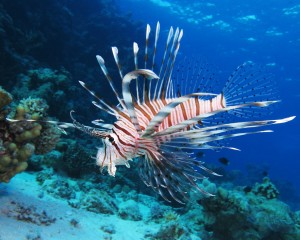

Florida is certainly no stranger to invasive species. We have all kinds of frogs, snakes, monkeys, lizards, and insects that have been introduced over the years. Some, such as the python, causes some real issues. Others seem to take their place in the Florida ecological system without doing much damage. But there’s one invasive species that could really take a toll on our eco-system: the invasive lionfish.
This species is native to the Indian and Pacific Oceans, but were introduced to the Atlantic waters in the 1990s. Unfortunately, they are voracious predators and are wreaking havoc on the smaller fish population. The populations affected include grouper and snapper, which unfortunately – then cause problems with the fishing industry.
It’s also unfortunate that the Lionfish can spawn all year round and has no natural predators in the Atlantic. Some scientists believe that the Lionfish is one of the greatest threats to the Atlantic Ocean and could change our ecosystem forever.
Scientists believe that the Lionfish was first introduced by someone releasing aquarium fish into the wild. This is because DNA testing on the fish show that most of today’s Lionfish in Florida can be traced back to 6 or 7 original fish. People release non-native species simply because they can no longer take care of them or they no longer wish to own them.
In recent years, some local restaurants have decided to encourage humans to become the Lionfish’s great predator. They’ve started serving Lionfish on the menu and amazingly, have cultivated quite a following. Lionfish can also be used to make jewelry and knick-knacks.
Although some fisherman have jumped on the bandwagon, it’s important to remember that Lionfish have venomous spines that can cause extreme pain at the sting site. Although not usually fatal to humans, being stung can cause symptoms such as heart palpitations, stinging, burning, blistering, sharp throbbing pain or even seizures. In order to avoid stings, it’s best to catch Lionfish with a net or with a spear as opposed to a fishing pole. The flesh of the lionfish is not poisonous or venomous and is actually considered an excellent white fish choice by connoisseurs.
Fishermen are encouraged to remove any and all Lionfish they may catch or encounter. Although it may not seem like such a big deal, removing a Lionfish whenever it’s seen can certainly help in the eradication efforts. If you are out in the ocean and do not feel comfortable attempting to capture the Lionfish, you should at least report it at the REEF site or the US Geological Survey Site.
